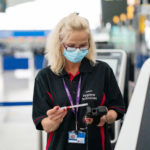Half of all of companies within the FTSE Aerospace and Defense sector issued profit warnings in the last 12 months, according to the latest EY-Parthenon Profit Warnings Report.
The report added that significant airline restructuring was likely to further impact the wider aviation sector. Companies operating within the sector issued 11 profit warnings in the last 12 months, 81 per cent of these citing the impact of COVID-19.
While there was a record low level of profit warnings among all UK-listed companies in Q2 2021, FTSE Aerospace and Defense was the sector with the highest number of warnings (3) – an increase on the previous quarter.
Seasonality will increase in the absence of business travel
Matt Ward, EY UK&I Aerospace and Defence leader, said: “Covid-19 had an unprecedented impact on air travel, with implications for the entire aviation sector – from aerospace manufacturers to airlines, airports and related service providers. Most companies that recapitalised in mid-2020 are unlikely to have foreseen that summer 2021 would bring continued travel restrictions and a high level of uncertainty around permitted destinations.”
related service providers. Most companies that recapitalised in mid-2020 are unlikely to have foreseen that summer 2021 would bring continued travel restrictions and a high level of uncertainty around permitted destinations.”
“Slower growth and a decline in high-yield, year-round business travel will reduce cashflow and increase seasonality and balance sheet stresses. This comes on top of increased airline debts and overcapacity issues that pre-date the pandemic. We expect to see significant airline restructuring, with knock-on impacts for the entire value chain.
But he added the pandemic had also resulted in a greater shift towards sustainability: “The sudden drop in demand and increasing cost pressures have also catalysed a step-change towards less carbon-intensive air travel, with widespread decommissioning of older fleet and increasing focus on efficient aircraft. This shift to sustainability will have a transformative impact on the supply chain but may offer opportunities for growth for well-positioned companies.”
Passenger volumes unlikely to recover until 2023
The number of profit warnings from airlines – a sub-sector of FTSE Travel and Leisure – increased from two in 2019 to six in 2020. In EY’s Aviation Recovery Tracker base-case scenario, UK passenger volumes will not recover to 2019 levels until 2023, while growth rates would remain below 2019 levels. Business travel – which accounts for 12 per cent of passengers, but as much as 75 per cent of airline profits – is not predicted to recover until 2030, due to the growth of video conferencing alongside corporate pressures to meet cost-saving and carbon emission targets.
Cash is still king
The EY-Parthenon revealed a record low of just 32 profit warnings from all UK-listed companies in Q2 2021, the lowest quarterly total EY has recorded in over 22 years of profit warning analysis. The second quarter’s record low comes in stark contrast to the record high of 301 in Q1 2020 and the second highest ever total of 165 in Q2 2020.
EY recorded similar dips in 2002/3 and 2009 after 9/11 and the global financial crash, respectively. Analysis suggests that markets tend to over-correct and last year’s drastic expectations reset, combined with a better-than-expected recovery and Government support, meant that all but a handful of companies beat depressed forecasts.
But most Government support schemes came to an end or begun to taper at the start of the third quarter of this year. Falling levels of support and rising costs will increase the focus on companies’ need to plan and manage their cash positions carefully.
Outlook improving, but there’s still uncertainty
 Meg Wilson, EY-Parthenon Partner, Turnaround and Restructuring Strategy, said: “The economic outlook is improving, but for many companies there is still uncertainty. Businesses reopening or expanding their trading are balancing the investment and costs needed to meet increased demand against the removal of Government support and the potential for setbacks. They also need to be mindful of how cash is flowing through their supply chains.
Meg Wilson, EY-Parthenon Partner, Turnaround and Restructuring Strategy, said: “The economic outlook is improving, but for many companies there is still uncertainty. Businesses reopening or expanding their trading are balancing the investment and costs needed to meet increased demand against the removal of Government support and the potential for setbacks. They also need to be mindful of how cash is flowing through their supply chains.
“Companies in rebuild mode need to be vigilant to their exposure to contingent or ‘soft credit’, be it direct or indirect, for example through credit insurance – an important but often overlooked element of liquidity.”
Through the framework of the Trade Credit Reinsurance (TCR) Scheme, which ended on 30 June 2021, the Government estimates that it has assisted over half a million businesses, protecting £575 billion of business turnover.
Wilson added: “As trading rebuilds and exposures start to increase, engaging proactively with credit insurers now the TCR scheme has ended and other suppliers of ‘soft credit’ may be necessary to ensure continued support and preserve liquidity. In this delicate transition time, bringing all stakeholders on the journey is going to be key.”
Aviation sector must adapt to a low carbon world
Matt Ward added: “To position for recovery, businesses within the aviation sector must focus on conserving cash and capital, increasing the flexibility needed to transition off government support, and resuming full-scale operations. But they also need to consider the transformation required to succeed in a world with reduced business travel and a focus on low carbon. The winners will be the companies that can innovate and adapt their operations for this challenging marketplace.”

